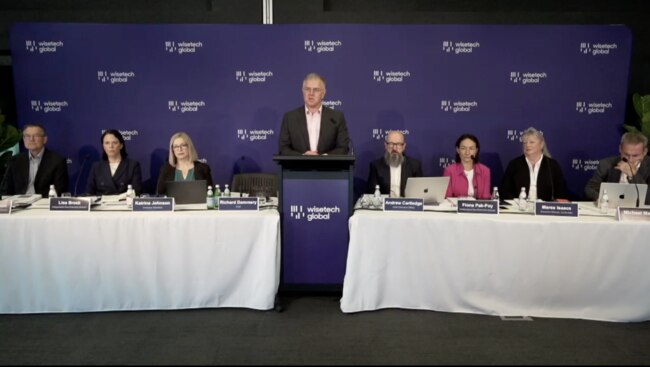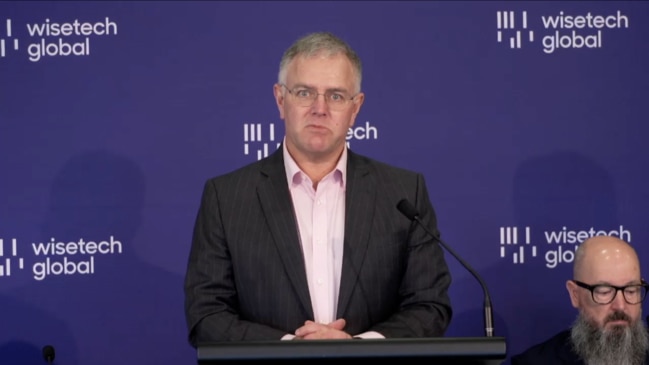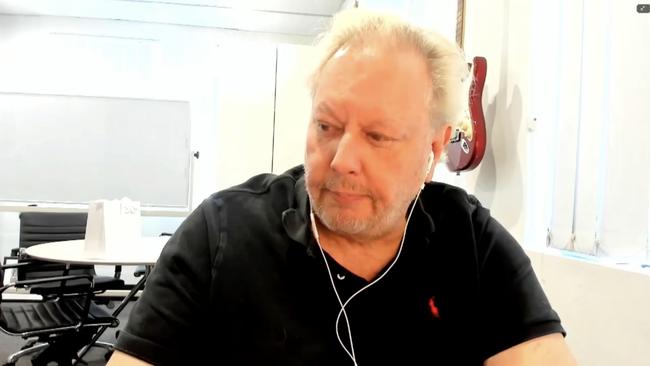$5.9bn and counting: WiseTech reveals cost of Richard White scandal
Investors are asking questions that may never be answered as WiseTech’s earnings and share price took a massive hit from the sensational allegations that engulfed its billionaire founder.

WiseTech has revealed how much a scandal involving its billionaire founder has cost the company. But also has more questions to answer.
The company downgraded its earnings forecast on Friday, about 20 minutes before it was set to face investors at its online-only annual meeting.
It wiped up to $150m off its revenue estimate and up to $100m off earnings before interest, tax, depreciation and amortisation, sparking a share price fall up to 20 per cent. It later clawed back almost half those losses but $5.9bn was still blasted from its market cap.
Chairman Richard Dammery did not hide his displeasure over the source of the downgrade: the sensational allegations that engulfed the company’s founder Richard White, which ranged from exchanging business advice for sex to bullying and intimidation.

“Upfront, I need to say that the board is disappointed that the diversion of Richard White’s attention away from product development at a critical juncture has impacted the timing of the release of some of the three breakthrough products. This will result in changes to both revenue and earnings guidance,” Dammery told investors.
Two minutes after WiseTech announced the earnings downgrade to the ASX, it issued another statement revealing that the lawyers the board had commissioned to investigate the allegations surrounding White had thus far found no evidence of misconduct. In regard to the bullying allegation – made by former director Christine Holman – that was attributed to “creative abrasion” that had created “significant value” for WiseTech.
Much of this was Seyfarth Shaw’s work, Dammery said, the same law firm that Fortescue called to investigate Andrew Forrest’s alleged relationship with an employee. Like with Forrest, Seyfarth Shaw found none of the matters were substantiated and made no adverse findings against White.
Dammery said Seyfarth Shaw had been diligent, interviewing 21 people in 30 interviews.
“The advisers also retained specialist support as needed, including forensic accounting support. Each of the findings, which is self-explanatory, indicates no impropriety by Richard White, in relation to the affairs of the company.”
But WiseTech still has questions to answer, despite the best efforts of some investors to extract more information from Dammery and the board.
“There are so many accusations of bullying, suppliers in a personal relationship with CEO, staff in a sexual relationship with CEO, personal behaviour in conflict with company culture, class actions. Exactly how many investigations are underway, which external experts are leading this investigation?” the Australian Shareholders Association asked Dammery.
Dammery said: “Well, I’m not sure I would necessarily agree with the characterisation of your question. Respectfully, so many accusations. There haven’t been many accusations of bullying, aside from the suggestion in Christine Holman’s resignation letter, which was properly examined by the board at the time.”
In regard to the other allegations involving White’s relationship with employees and suppliers, Dammery highlighted Seyfarth Shaw’s work: “There was no failure of disclosure.”
But the board’s investigation was constrained to “affairs of the company” not White’s own affairs. The questions relating to White’s personal life and what triggered the string of allegations: his attempt to bankrupt former lover Linda Rogan and another woman, Jenna Riches, who told The Australian that White had also allegedly offered her business advice in exchange for sex – may never be answered.
Rogan and White have since settled their legal dispute, and the board could not delve into White’s private life, despite his “personal identity” being “deeply intertwined” with WiseTech.
“Many of the allegations or assertions were, and remain untested and unproven, and I note that because some matters were before the courts, both the board and Richard White were constrained to comments we could make,” Dammery said.

“As a board, we recognise and acknowledge that every Founder’s personal identity is deeply intertwined with that of the company they build, particularly after a 30-year journey in WiseTech’s case. The board also acknowledges that the media attention deeply affected the company, its reputation and some team members.”
For his part, White told investors that he was “truly sorry” and plans to stay at the company – both on the shareholder register and in a new consulting role in which he will report to the board and maintain his $1m a year salary.
“I’ve always taken the view that a gentle, orderly, predictable sell down is an appropriate thing for somebody who has a large stake and who is a founder and creator of the company. And I continue to have that view,” White said.
“I also continue to have the view that I will remain a substantial shareholder for the very long term.”





To join the conversation, please log in. Don't have an account? Register
Join the conversation, you are commenting as Logout